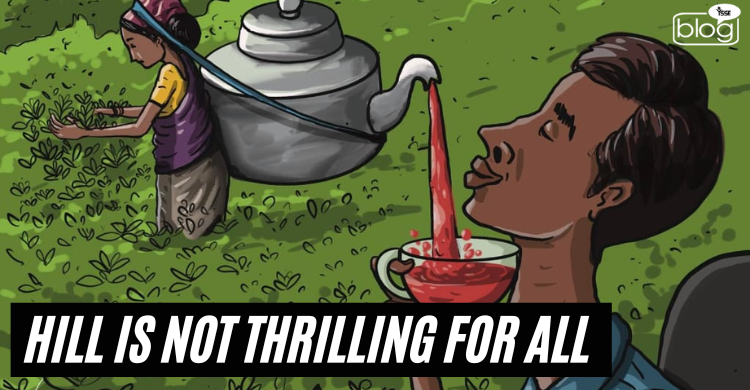“Why is it so expensive to just have a cup of tea? Is it made of gold ?”
Unfortunately, the answer is “NO” This is not made of gold. But this is made by the lakhs of tea worker’s tears. As we only see a cup of which is made by a spoon of tea leaves, we can’t see the struggle of the collectors of tea workers.
In the era of implementing Human Rights, the question arises how successful are we to give the tea workers proper rights? Let’s see how miserable life the Bangladeshi tea workers are leading:
With origins dating back to the British colonial era, the history of Bangladeshi tea laborers is complicated. The nation’s economy has benefited greatly from the tea sector, but it has also historically been linked to worker abuse and suffering.
Colonial Period:
In the 1800s, the British East India Company brought tea planting to Bangladesh.For the purpose of working on the tea plantations, the British hired indentured laborers from India, especially from Assam and Bihar. Low pay and difficult working conditions were commonplace for these laborers. The high interest rates on loans prevented many workers from leaving the plantations, trapping them in a cycle of debt bondage.
After independence:
Although Bangladesh gained its independence in 1971, the conditions of employment for tea workers remained the same, with limited access to healthcare and education, low wages, and poor living conditions. To protect their rights, workers began organizing into labor unions, but these organizations were often persecuted by the authorities and tea plantation owners of the company. In recent years, tea individuals have faced a number of challenges, including low wages, long hours, and dangerous working conditions. They have called for improved pay and working conditions through a number of demonstrations and strikes.
Isn’t there any way to implement the Rights of those tea workers? Let’s see :
Wage and Labor Rights:
Ensure that the tea workers get a reasonable wage that properly supports them in sustaining a decent standard of living and paying their necessary expenses. Implementation of minimum wage rules for tea workers and enforce them effectively. On the other hand, Tea workers should be eligible for social security benefits like pensions, health insurance, and unemployment insurance. Establish safety regulations to prevent workers from dangers and injuries at work. Limit working hours to protect exploitation and ensure adequate basic rights.
The living conditions:
In addition to decent living facilities, fresh water, and adequate sanitation have no alternative. So it must ensure that everyone has the facilities to get pure water & adequate sanitization, especially women and children. Make schooling available and free for the children who work in the tea sector. In addition to protecting tea workers from hunger, promoting labor-friendly programs which will improve their general health.
Legal and Social Rights:
Must have given tea workers the freedom to organize and create unions in order to protect their rights. Action should be taken as quickly as feasible against the practice of discrimination on the basis of gender, caste, religion, or ethnicity. Legal assistance should also be made available to tea workers so they can protect their rights and pursue justice.
Rights of Land :
Protect the rights of tribes and tea workers to their land. These steps can be taken to guarantee that the human rights of Bangladeshi tea harvesters are upheld and that their lives are improved.
But, A big question arises is it possible to balance the price of tea increasing their facilities of life? Won’t their rights impact the price of tea? Are we ready to compromise the price of tea for the sake of the tea workers?
To read more blogs, click here
Writer
Ferdous Noor Prova
Intern, Content Writing Department
YSSE

